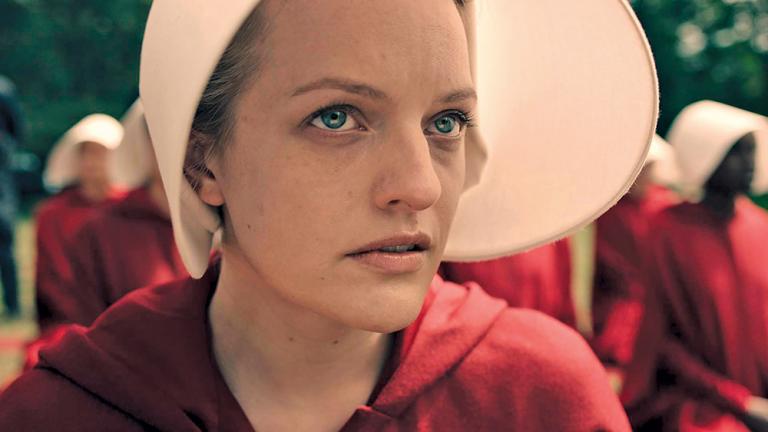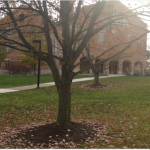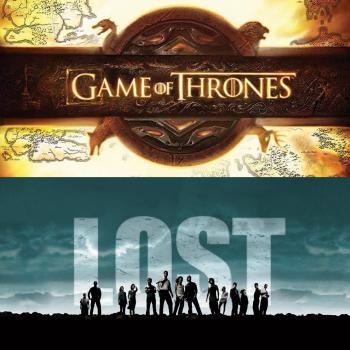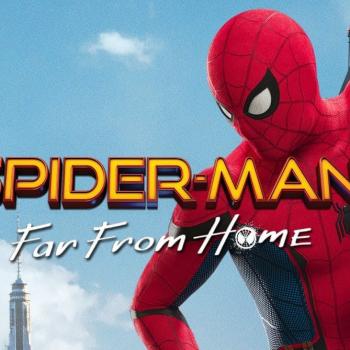
Caution: Contains light spoilers.
Last year, Hulu premiered the multiple Emmy-award winning series, The Handmaid’s Tale, based on the Margaret Atwood novel of the same name. This week, The Handmaid’s Tale returns for a second season, expanding the world of the future dystopia with advice from the author.
By now, you’ve heard from your friends how great, how harrowing, how intense the show is. And it’s Friday night, and everyone else is out watching Captain America beat up the latest big bad. So, the question becomes…
Should I see it?
See It If…
- You’re a fan of the novel. This is a gorgeous adaptation and had direct input from the author, assuring authenticity of vision.
- You’re a fan of really intelligent art direction and cinematography. The use of modern rock music, especially at key moments; the brilliant diminishing and cornering of women in the shot to create a claustrophobic atmosphere vs. the free, open and centered nature of the flashbacks; the diffuse colorization to make the handmaid’s red clothing really pop – all of it is spot on. (See a great video about that here!)
- You’re having a rough day and need something to help you generalize about men. (Before you comment, watch the video.)
Don’t See It If…
- You’re easily triggered by intense – but not graphic – explorations of stories about psychological, sexual and emotional abuse, and physical violence and death. Make no mistake about it: this series is intense. I actually watched only the first two minutes before turning it off the first time I tried the series. It’s great if you’re in a good head space (or maybe are doing something else simultaneously – I like to play puzzle games), but light comedy this ain’t.
- You’re turned off by language. The F-bomb is dropped pretty regularly, although always to good effect. Once again, this is a harsh world and the language is, too.
- You don’t want to engage in the question of what an American theocracy gone bad might look like. This was another reason I didn’t watch the series until this summer. My impression was that the book was merely an attack upon Christianity, and I wasn’t in the mood to give it a fair viewing. If you’re on the fence about watching, I suggest watching Thug Notes’ excellent primer to get an idea of whether this is the story for you.
What About Questionable Content for Concerned Christians?
Once again, if you’re someone who’s easily triggered, you’re probably better off skipping this one. But if you are interested in exploring the world of Gilead, here’s some things to keep an eye out for:
- The theocracy that takes over is explicitly Christian, although not particularly tied to any one denomination.
In good speculative fiction fashion, Atwood has created a series of faux calls and responses (“Under His eye,” rather than “Peace be with you,” or even “Bless your heart”) that elicit a sense of American Christianity, without being explicit. As such, the series is looking at how we weaponize religion, rather than dissecting or rejecting the tenets of religion itself.
In fact, at the end of the second episode of the second season, our heroine June (once known as Offred), kneels and prays for the souls of the faithful departed “through Christ, Our Lord, amen.” Despite having been victimized by those who profess Christianity, she still cleaves to God.
- In the dystopia of Gilead, gays and lesbians are targeted.
It’s true that Atwood’s novel paints gays and lesbians with sympathy. If you’re concerned but want to watch the series, I welcome you to consider this: that all entertainment is meant to make you understand and empathize with someone else’s life story, even if you reject or have quarrel with an underpinning philosophy.
One of the characters, Emily, known as Ofglen, tells of how she was pulled apart from her wife and son once Gilead was formed. She is then severely punished for having a relationship with another woman while she is in slavery as a handmaid.
When I watched this, I was reminded of a colleague of mine, a married gay man, with whom I had dinner the night after Trump’s election. My colleague was shaking, literally terrified that he would ripped from his home, his job, his spouse.
It’s worth it, as a Christian, to wonder whether you would do that to another person in the name of God. Whether your gay neighbor has a right to fear you. Again: I encourage watching the series in order to understand someone else’s fears, and then question whether – given the chance – you’d be a good neighbor or not.
Think of it another way: how well have we been protecting those families Trump is pulling apart? Not gay spouses, perhaps. But targeting black, Latino, and Muslim families? DREAMers? ICE? It’s happening now, and to my shame I’m not doing anything about it.
How Christ-like are you, fellow sinner?
- Atwood is particularly adept at showing how women can be turned to police each other – and the damage that does to ourselves and our society.
Some of my favorite episodes from season one are the flashbacks showing just how we got here. Watching Mrs. Waterford’s backstory – how she was instrumental in creating legislation, perfectly reasonable legislation – that enslaved women and then enslaved her, too. Watching the peer pressure that other Handmaids put on each other, not knowing whether any other woman is a friend or enemy. Watching the religious platitudes that the Aunts spit in order to control the minds of the Handmaids…which is really controlling themselves, too…
It’s rough to watch.
But anyone who’s been around long enough knows that one woman who shames other women in the Mommy group for “doing it wrong,” or for explaining why the tool of NFP isn’t working for them, or for going back to work when a woman’s role is to be in the home only, or for not being married because a woman’s role is to be married and in the home only…
Or denying that rape can happen in marriages, or for calling women who’ve been raped whores, or any of the other terrible thoughts that women perpetuate in themselves. And, alas too often, under the sanction of religion.
And, hopefully, how unnecessary that is. How beautiful female friendship can be. How strong women truly are, when we stop belittling ourselves and belittling each other.
- Sex is a major factor of the story, since the world of Gilead is based around the idea that only a portion of women are still fertile.
Do be aware that there are many sex scenes in The Handmaid’s Tale – all of them crucial to the very fabric of the story. Unlike HBO’s penchant to show boobies, boobies everywhere, the sex scenes – most of them rape scenes – in The Handmaid’s Tale are utterly painful to watch. But not because they’re graphic.
To the contrary: nothing of note is visible, most of the scenes are done clothed, and the camera remains more on the faces than anything. The scenes are massively uncomfortable – and they’re meant to be. This isn’t porn. You won’t get aroused by it. Instead, it shows how the rape hurts everyone involved.
(In Gilead, fertile women, “handmaids,” are enslaved to commanders and their infertile wives. The handmaiden lie in the wife’s lap, holding her hands, while the commander penetrates the handmaid. In flashbacks, it’s shown how Mrs. Waterford, a wife, was instrumental in creating this symbolism – which now is the very thing killing her marriage and her soul.)
About halfway through, our heroine does rediscover the joys of sex again when she gets to freely choose a partner for herself. And while shot with modesty, you do get the sense of abandon and freedom and ache that our heroine feels in having control – even to a degree – over her body again. However, those of a sensitive nature can probably fast forward through the sex scenes and still get the impact.
To Watch Or Not To Watch
Once I finally got into The Handmaid’s Tale (being an easily triggered viewer myself), I valued it tremendously. It’s the sort of viewing that makes you want to grab some friends and delve into the thought experiment and the questions that the story raises.
If you’re on the fence, I do encourage you to research the plot of the book and on-line commentary such as this, to help you consider whether The Handmaid’s Tale is right for you. Artistically, and in our current culture, it is important viewing. It is part of the conversation. And it is intense to watch.
Season two, with new episodes every Wednesday, has started off tonally strong thus far. Although I worry, as I always do, that it won’t match the first season for structure. (See Season One vs. Season Two of Stranger Things for reference.) The first two episodes available now act as prologue for plot to come. We’ll see how this deeper exploration into Atwood’s dystopian thought experiment proceeds.
And ’til then, maybe give your best gal-pal a hug. Stock up on the ice cream. And be glad we’re not in Gilead. (Yet.)
Want more reviews from the Pop Feminist? Now you can become a patron for as little as $1/month on Patreon!













